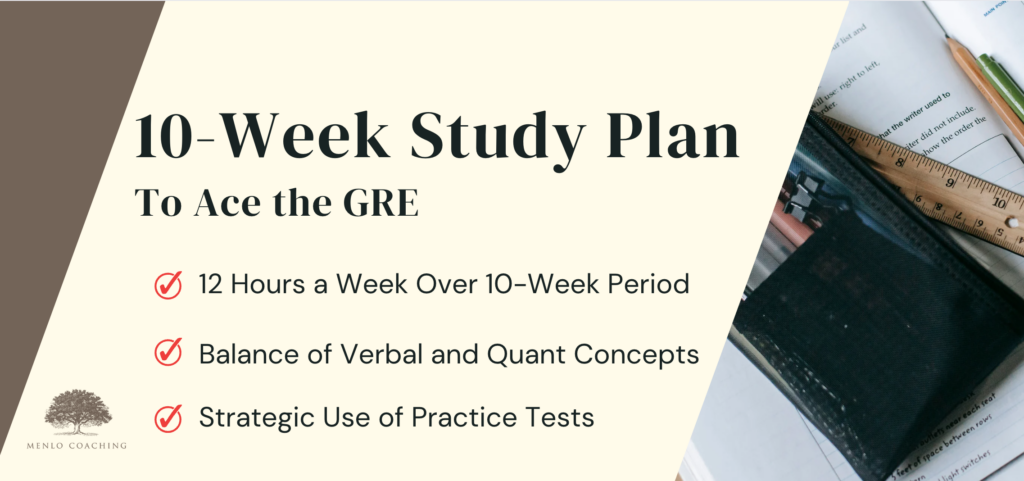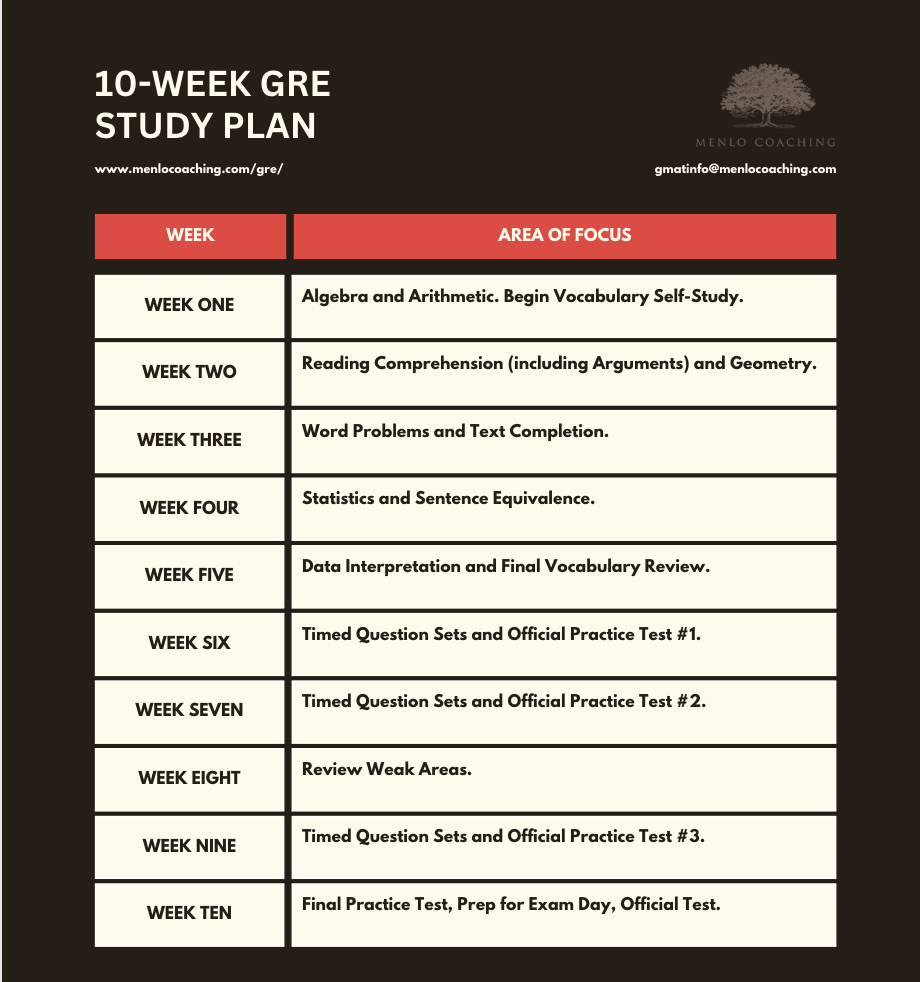Choosing when to study for the GRE might be the most important decision in the preparation process.
Most test takers underestimate how long it takes to prepare for the GRE, assuming that if they just dedicate one full month to their GRE prep, they can put it behind them and focus on their graduate program applications.
But here’s a secret: by condensing your GRE study into one hyper-intense month—with no time allocated for other elements of your graduate school applications—you are taking a big risk.
Firstly, even if you do get your target score in that short amount of time, you will have sacrificed other elements of your application.
In MBA applications, we see many candidates focus solely on the GRE or the GMAT in early spring, then by the time they’ve taken the test, campuses have shut down and there’s no opportunity to sit in on classes, network with student clubs, or attend on-campus information sessions.
What’s more, if you don’t achieve your target GRE score in this amount of time, you will suddenly have to balance test prep with the increasing pressure of your grad school applications and the other obligations you neglected while you were preparing for the GRE.

Instead of over-extending yourself in a single month, we recommend dedicating a longer, 10-week period to GRE prep (see our GRE study schedule below) and starting early!
This way, you can:
In this article, we’ll provide some golden rules for developing your own study plan for the new 2024 GRE exam as well as a sample 10-week GRE study schedule.
The biggest mistake anyone can make when it comes to the GRE is starting too late. Some GRE students take the test for the first time mere weeks ahead of their program deadlines—this is not a smart move!
In an ideal world, everyone would take the GRE towards the end of their undergraduate degree. GRE scores are reportable for 5 years, and test takers tend to score higher and be more efficient in their GRE preparation if they schedule their test date for when they’re still in “study-mode” and before they start a new post-graduation position.
Taking an exam that isn’t mandatory might seem like the least desirable option right after graduation, but it is a much better time to prepare than on your lunch break during the work week or after a long day at the office.
That said, most GRE takers can achieve their target scores in a number of months. With the right GRE study plan, this can even be achieved in as little as ten weeks.
Regardless, it’s never wise to leave your GRE prep until the last minute. Even if you plan on dedicating just ten weeks to the GRE, it’s better to commit those ten weeks with a long runway to your deadlines.
3 weeks of full-time test prep without a job is roughly equivalent to 8-10 weeks of test prep while working.
The GRE is a highly sophisticated exam, which requires mastery of content and a solid exam strategy. Your GRE study plan is much more effective and efficient when you are living and breathing the exam rather than struggling to stay awake while doing problems after a long day’s work.
If you have a window while you’re switching jobs or you’re planning on taking some extended time off for any reason, plan on doing your GRE prep then—even if you won’t be applying for several years. One of the reasons for this is that people who are able to prepare full-time for the exam typically score higher with less suffering.
Unfortunately, the majority of GRE test takers must prepare while working full-time.
If you are working while preparing for the GRE, choose a several-month GRE study period, during which:
You can see our 10-week GRE study schedule below for an example of how much time it could take to effectively study for the GRE.
If your supervisor is supportive of your plans to apply for graduate programs, let them know that you plan to dedicate a window of time to prepare for the GRE. Then, you can work out a schedule conducive to your studying.
Perhaps on Tuesdays and Thursdays you can go to work several hours later than normal so that you can put in a 2- to 3-hour study session each of those mornings.
Make a defined study schedule and don’t deviate from it—use your weekends for studying and avoid any extended trips or work travel.
It will be much less painful to study over an intense 10-week period than on-and-off over a year.
If you’ve never studied for the GRE before, starting with a diagnostic GRE practice test is a great way to identify your current baseline score.
It can also save you a lot of time and heartache to engage a GRE tutor earlier in the process. This comes with the added benefit of having an objective party who can evaluate your strengths and weaknesses in terms of exam technique as well as content.
In terms of selecting appropriate GRE study materials, we strongly recommend our students work with official GRE materials only. Also, in terms of GRE mock exams, although we cover this topic in more detail elsewhere, don’t waste the few valuable official GRE practice tests you have access to (5 in total).
These should only be used at the end of your GRE study timeline—you don’t want to take your last practice test before you’ve reviewed all the material! Unfortunately, GRE practice tests don’t evaluate your analytical writing skills, so make sure you understand the testing criteria for this distinct section.
Further, unofficial GRE practice questions cannot accurately test the concepts in the same way the official GRE practice questions can for several reasons—so avoid GRE book offers from third-party test prep companies. This is primarily because GRE questions are difficult and expensive to write. As a result, using unofficial practice questions can reinforce inefficient test technique and “spoil” the official materials for you.
Aside from choosing the right time and materials to study for the GRE, GRE prep efficiency relies heavily on consistency: set aside a period of a few months for highly-focused GRE prep. During this time, you should regularly review GRE materials, familiarize yourself with the test format, and eventually take full-length practice tests, which will put you in a strong position on test day.
You will feel more confident and prepared on the day of the actual GRE if you truly commit to your test preparation.
With a full-time job, you should plan on spending 2-3 hours on GRE preparation during 3 of your workdays, with a big 4-hour study session on one of your weekend days, and a shorter 2-hour session on the other.
Ideally, you should put in at least 12 hours a week over the 10-week period. Avoid short study sessions in which you are not able to dig deeply into topics and train both focus and pattern recognition. For those students who are not working full-time, you can likely condense this GRE study plan into a more concise 5-6 weeks.
Here’s a sample GRE study schedule. We’ll dive deeper into which topics to cover in a week-by-week discussion below.
| Week | Focus |
| 1 | Algebra and Arithmetic. Begin Vocabulary Self-Study. |
| 2 | Reading Comprehension (including Arguments) and Geometry. |
| 3 | Word Problems and Text Completion. |
| 4 | Statistics and Sentence Equivalence. |
| 5 | Data Interpretation and Final Vocabulary Review. |
| 6 | Timed Question Sets and Official Practice Test #1. |
| 7 | Timed Question Sets and Official Practice Test #2. |
| 8 | Review Weak Areas. |
| 9 | Timed Question Sets and Official Practice Test #3. |
| 10 | Final Practice Test, Prep for Exam Day, Official Test. |
Many GRE students believe that working with a GRE tutor for 30+ hours at a lower rate is a better deal than choosing a shorter, higher-impact package—but this is a false economy!
Depending on your starting point, you could achieve your target GRE score in as few as 6, 12, or 20 hours.
The Menlo Coaching GRE Curriculum is based on the use of Official GRE Materials only and balances content and strategy to maximize your performance on test day.
Reach out today to find out how quickly you can ace the GRE!

Refresh all core arithmetic (percents, ratios, factors/multiples, etc.) and algebra (linear equations, quadratics, inequalities, exponents/roots, etc.) content areas and apply that knowledge to specific collections of official problems testing the same content area.
Completing large batches of official GRE Quant problems for each major content area is essential for learning all the different question types and related solution strategies associated with that type. For practice questions, primarily use the GRE official guide material but add in questions from any older GRE official guide material you may have access to.
Aim to expand your advanced English vocabulary over this 10-week study period by a minimum of 1000 words. The best source of quality reference words is a vocabulary list that contains words taken solely from previous real GRE Verbal sections on previous real GRE exams. In terms of word retention, slow and steady wins the race here. Reviewing and learning a minimum of 100 words a week over a 10 week period will get you to 1,000+ words by the time you write your real GRE exam.
All students, even those with a strong English vocabulary base, will greatly benefit by expanding their English vocabulary knowledge significantly. Don’t underestimate how challenging the vocabulary tested on the GRE Verbal section can be. Those who make a serious sustained effort to expand their active vocabulary in advance of their real GRE exam almost always see a significant improvement in their GRE Verbal scores.
Learn key strategies for attacking traditional GRE reading comprehension questions (short and long passages) as well as the how to tackle all the main GRE argument based question types (i.e. strengthen, weaken, assumption, conclusion, flaw, paradox) and apply them to a collection of official GRE passages and questions.
Success in traditional reading comprehension depends on both your reading approach and your ability to recognize patterns and tricks related to specific types of questions. Supplement this by learning important strategies for argument-based questions as well and apply them to a collection of official problems.
Having specific, regimented strategies for both traditional GRE reading comprehension question as well as GRE argument-based questions is key to your overall success in this section of the exam. Unfortunately, most students who choose to self-study ultimately do not develop the proper systematic approach.
Refresh all core geometry shapes (square, rectangles, triangles, circles, and 3D shapes) geometry formulae (area, perimeter, volume, surface area, etc.) and geometry rules (impossible triangle, central angle rule, inscribed angle rule, etc.) and apply that knowledge to specific collections of official problems testing the above content areas. Do targeted practice sets of GRE geometry questions testing each of these core areas (shapes, formulae, and rules).
Learn strategies and best practices for attacking the common word problems used on the GRE. It is essential that you master the main word problems question types, because they are commonly tested on the GRE exam. This includes Rate/Work, Venn Diagram/Matrix Box, Mixture, Weighted Average, and Unit Conversion problems. Do large sets of each type of GRE word problem to get comfortable with all the various word problem question type variations that are commonly tested on the GRE.
Text completion (TC) questions require you to complete a short text-based passage to create the most logically complete sentence that best fits the original meaning of the author. These vocabulary-based questions can be divided into three main categories; single blank, double blank, and triple blank.
You should aim to do a sufficiently large number of practice problems for each of these three main TC question variations. Doing so will provide you with the opportunity to work on expanding your GRE vocabulary while at the same time implementing a variety of best practice POE strategies for cases where you are familiar with the definitions of all, some, or none of the words in the answer choices.
Use this week to focus on the “secondary” but more difficult quant content area of statistics. Make sure you have mastery of the basic descriptive statistics—mean, median, mode, range, and standard deviation—and a solid foundation in basic probability and combinatorics.
Do targeted practice sets of GRE statistics questions testing each of these high-level content areas.
Sentence Equivalence (SE) questions also require you to complete a short text-based passage to create the most logically complete sentence that best fits the meaning of the original sentence. The major difference here is that you will need to pick two answer choices, not one answer choice, and the two answer choices will need to be synonymous words.
This challenging GRE Verbal question type is once again mostly vocabulary based. As such, like with GRE text completion questions, you should aim to do a sufficiently large number of these practice problems to give you the opportunity to further work on expanding your GRE vocabulary as well as continuing to implement a slightly revised set of best practice POE strategies, including a small number of sentence equivalence specific elimination techniques (i.e. eliminating answer choices based on non-synonymous matches).
GRE Data Interpretation questions (formerly known as Charts & Graphs) require you to analyze and interpret data provided in some type of graphical or pictorial form and then answer a short set of questions based on them. Data interpretation questions can be divided into three main question type categories; single chart, double chart, and triple chart.
You should aim to do a sufficiently large number of practice problems for each of the three main data interpretation question types. This will allow you to familiarize yourself with the mostly commonly tested chart and graph formats (i.e. pie charts, bar charts, line charts, area charts, tables, grids, matrices, etc.) that appear on the GRE.
In terms of vocabulary, spend this week focusing on reviewing all the new GRE Vocabulary words you have learned so far. Practice reviewing these words in multiple different ways to ensure you have consistent immediate recall for all of them. This will be a core component of the overall verbal skill set required to improve your score on the two main GRE vocabulary related question types (text completion and sentence equivalence).
Using the Official GRE Super Power Pack study resources do 2 rounds of timed sets of Quant and Verbal questions: Select the ‘Easy’ question sets to start with for both sections.
Complete your first official GRE PowerPrep practice test.
Using the Official GRE Super Power Pack study resources do 2 rounds of timed sets of Quant and Verbal questions: Select the ‘Medium’ question sets this time for both sections.
Complete your second official GRE PowerPrep practice test.
Use your results from the previous two weeks of timed sets and GRE PowerPrep practice tests to determine your outstanding weak areas and do a deep dive back into those question types and content areas.
Maybe on the quant side you find that quantitative comparison questions testing algebra, overlapping figure geometry questions, or data interpretation questions are causing problems. Revisit those content areas and do additional sets of those question types.
Maybe on the verbal side you find argument questions in reading comprehension and/or high-level vocabulary in text completion and sentence equivalence is causing problems. Use this week to shore up these weaker areas and create a solid floor going into your final two weeks.
Using the Official GRE Super Power Pack study resources do 2 rounds of timed sets of Quant and Verbal questions: Select the ‘Hard’ question sets this time for both sections.
Complete your third official GRE PowerPrep practice test.
Complete your fourth and final official GRE PowerPrep practice test.
Do your final preparation for the logistics of the real exam day. For example, if you are planning to write the GRE @ Home exam, this includes setting up your desk, PC, whiteboard, etc. to ensure everything meets with ETS exam requirements.
Crush the official GRE exam with a Quant 165+/Verbal 165+ score!
If you don’t get the GRE score you want, wait 10 business days until your GRE Diagnostic Service report (essentially the GRE version on an enhanced score report) is available in your ETS account. Review this report in detail to identify any Quant & Verbal areas of weakness.
Take an appropriate amount of self-study time to work on fixing these weaknesses. Lastly, use the remaining GRE practice tests and other ETS Official Guide resources to prepare for your next real GRE exam attempt.
When you’re studying for the GRE, it’s important to:
This way, a 10-week period should be sufficient to get the GRE score you need.
Follow our 10-week GRE Study Plan to stay on track over this period, making strategic use of official practice materials.
If you’re struggling with GRE self-study—or if you’d like to guarantee you prepare correctly the first time—consider working with an experienced GRE tutor.
